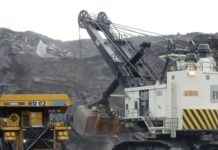[miningmx.com] — Australia will impose an interim dumping duty of 16 percent on some aluminium extrusions from China, but in a separate decision, Canberra cleared the way for a Chinese steel group to invest in the country.
The duty on imports, which follows a similar move by Canada in March, illustrates how China’s massive industrial overcapacity is starting to feed through into trade disputes.
Australian customs authorities are due to make a recommendation to the Minister of Home Affairs by April 15 on whether to impose final duties on the extrusions, which are used to make window frames and siding, the Australian Customs and Border Protection Service said on its website.
Industry experts played down the dispute, and Australia said the action would not impact its trade relationship with China.
“These types of actions are part of the cut and thrust of international trading and are consistent with international trade rules,” a spokesman from Australia’s Department of Foreign Affairs and Trade said on Thursday.
As news of the dispute emerged, iron ore developer Centrex Metals Ltd said Canberra had approved a A$271 million ($247 million) investment by Wuhan Iron & Steel, China’s third largest steel group.
Under the deal, Wuhan Iron will take a 15 percent stake in Centrex and form a joint venture with Centrex to develop iron ore resources in South Australia state, which Centrex said could contain up to two billion tonnes of ore.
The approval of the deal by Australia’s Foreign Investment Review Board follows the granting of permission last month for Chinese steel maker Baosteel to take a 15 percent stake in iron ore explorer Aquila Resources.
Chinese attempts to buy into Australia’s lucrative resources industry have strained ties between the two countries.
However, last month China declared a truce with Australia, during a visit by vice premier Li Keqiang, after months of tensions following the failure of a bid by Chinese state-owned aluminium firm, Chinalco, to increase its stake in Australian miner Rio Tinto.
During contentious iron ore negotiations this summer, Chinese authorities raided Rio’s office and detained four of its Shanghai-based employees, one of whom is an Australian citizen. Tensions could heat up again as iron ore negotiations begin for the upcoming fiscal year.
DUMPING DUTIES
Although anti-dumping cases are fairly routine between China and its trading partners, the emerging giant is keen to defend markets for the exports on which its economy depends.
At the same time, Australia’s relatively small manufacturing base means the resource-rich country generally has few complaints over competition from imports.
This year, it fielded cases on currants from Greece, and polyethylene, resins, concrete additives, galvanized steel and cardboard from other countries — a relatively light list. It also investigated steel sections and toilet paper from China and elsewhere.
“It’s not often Australia imposes duties and they have to go through a strict process to get these measures imposed,” said a commodities analyst in Sydney, who declined to be named.
“It’s symbolic. No one in China will be happy, but it won’t be a massive blow. China of course has levers to pull if they feel aggrieved. They are big a importer of bauxite from Australia, but retaliation like that is a bit of a blunt instrument.”
Trade data released earlier on Thursday found China had overtaken Japan as Australia’s biggest trade partner. Total two -way trade with China increased by 30 percent to A$83 billion ($75.2 billion) in the year to June 30, 2009.
Australian extruded products maker Capral Ltd had complained that Chinese imports were subsidised by Beijing and damage the Australian market. Chinese importers and Capral each account for about a third of the 155,000 tonnes of extruded aluminium goods consumed annually in Australia.
The Chinese aluminium industry invested heavily in extrusion capacity over the past few years, to circumvent export tariffs meant to discourage investment in aluminium smelters.
China’s exports of aluminium products in the first nine months of the year fell 36.6 percent from a year earlier to 950,000 tonnes, official customs data showed.










